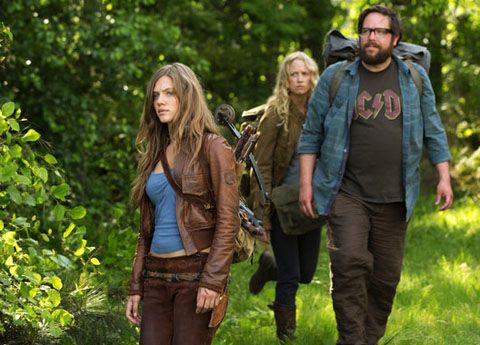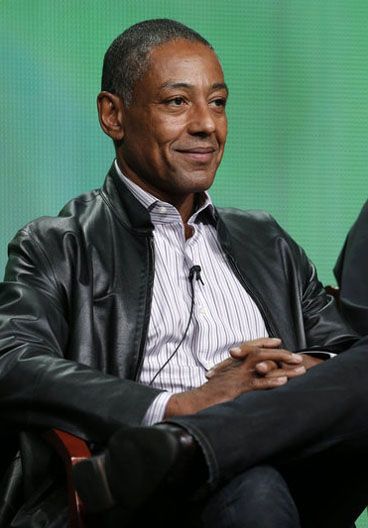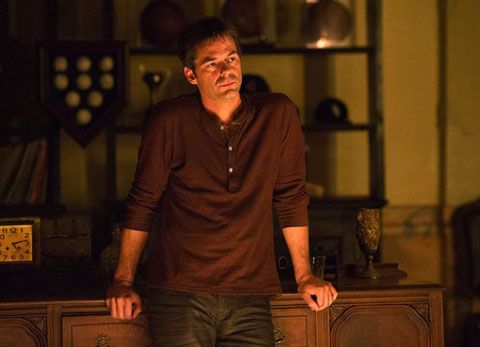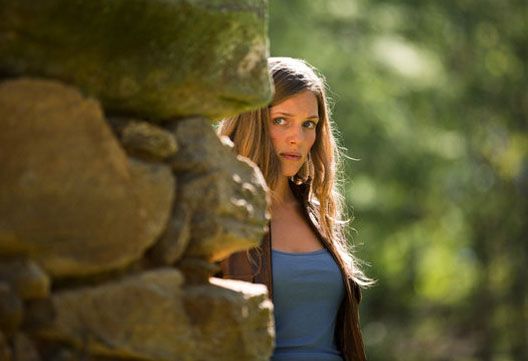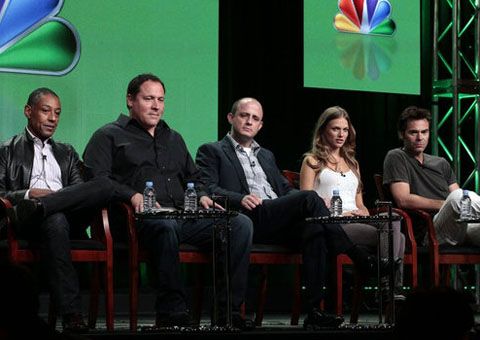The new NBC drama series Revolution, premiering on September 17th, tells the story of a family that struggles to reunite in an American landscape where every single piece of technology -- computers, planes, cars, phones and even lights -- has mysteriously blacked out forever. The show is centered around one strong-willed young woman, Charlie Matheson (Tracy Spiridakos), whose brother (Graham Rogers) is kidnapped by militia leaders, forcing her to reconnect with her estranged uncle (Billy Burke), in order to rescue Danny, overthrow the militia, and ultimately re-establish the United States of America, all while they explore the enduring mystery of why the power failed and if it will ever return.
While at the NBC portion of the TCAPress Tour, co-executive producer/pilot director Jon Favreau talked about the appeal of the series, why they’re doing serialized television through a network, the desire to be transformed and transported by a TV show, the influence of Planet of the Apes and Logan’s Run, and the biggest restrictions in storytelling in film versus on television. He also talked about what his version of John Carter might have looked like. Check out what he had to say after the jump.
Question: It seems like for serialized television, cable would have so many more advantages, with a shorter season and somewhat of a guarantee that you’re going to be able to finish a season, which aren’t necessarily true on network television. So, why still do serialized television through a network?
JON FAVREAU: I think what you’re seeing now, and as a viewer and consumer of stories myself, is that what started off as a trend with cable television, has spread out and now is hitting network. The audience has a tremendous capacity for sophisticated storylines. And as the movie industry becomes more and more restrictive, for a number of reasons, you’re seeing this opening up on the TV front, and that’s part of why I came on board this project. There’s always going to be dumb stuff out there, but there is room for really smart storylines. The audiences have become increasingly sophisticated. And, of course, it’s about developing a balance, so that somebody can tune into the show and jump right in, even if they miss the first couple of episodes, and understand who the characters are and how the stories work. But, there is a serialized version where you could unfold some more sophisticated storylines, emotionally.
With this show, the laws of physics seem to have changed. So, while there’s an underlying mystery with an internal logic to it, we still want to make it about the people and the emotion. I think you’re seeing an appetite, both with the audiences and therefore with the networks, to try to accommodate this more ambitious style of storytelling, and hats off to NBC for giving the show a shot. When I read it, I didn’t think of it as a network show, a cable show, a pay-cable show or a subscription show. I just knew that it was good writing, and I didn’t know what was going to happen, every time I turned the page. I sat down with J.J. [Abrams] and Eric [Kripke], completely compelled by their vision, and we put together an amazing cast. It’s nice to be able to absorb what we’re learning from the audiences, by what they’re rewarding the networks for putting on. Hopefully, we’re going to be breaking new ground here.
What was the appeal of this show for you?
FAVREAU: When I first heard that Eric was saying one of his inspiration was The Lord of the Rings, I didn’t really understand. But then, as I saw the sword fights, and the simpler times and the more brutal times, it presented itself as a moment where you had to stick together. The good people stuck with the good people. The people who were trying to create society and keep chaos from asserting itself had to struggle and sacrifice a great deal. That’s the heroic, aspirational quality to this that I think the visuals reinforce by making it something where you’re entering into another world. I know that when I watch TV, I want to be transformed and transported, not just by the characters that I grow to love, over the hours and seasons of watching, but also the world that it plants me into. The look and the aesthetic of this is just as much of a character as the people that are saying the words.
Whose idea was it to show Wrigley Field, overgrown and decaying?
FAVREAU: We had been looking at different landmarks from Chicago, and that really jumped out as the one that felt the most human, but also seemed to represent society and history. And as we were developing a look for the pilot, we kept looking at photos of Angkor Wat and looking at what it looked like when a society used to exist, but then nature slowly took it back over. We didn’t want this to be a dystopic view of the future, especially because it’s told through the lens of two different generations. You have the people who were there before the lights went out, 15 years ago, and then you have the new generation that never knew the old ways. So, while people are struggling to hold onto shreds of the old society, and struggling to get the lights back on and figure out the solutions to the mystery, there’s Charlie’s generation, who see this almost as a pastoral, simple place that they grew up. This is the only world they know. And we wanted to show a lot of the show through their eyes, so it didn’t feel like The Road or Mad Max, but instead felt like this wonderland.
Were Planet of the Apes and Logan’s Run favorite movies of yours, when you were a kid?
FAVREAU: With Logan’s Run, I like how, when they got outside into the Sanctuary, we definitely did discuss that, as a point of reference, because I’m remembering having seen it, through the lens of my childhood. I haven’t seen Logan’s Run recently, but it definitely hit me, at a time when I was impressionable, especially Farrah Fawcett as the lovely plastic surgeon’s assistant. But, I remember that once they got outside of the tech zone, everything was overgrown and there was that sense of a rainforest that had reclaimed an ancient society. The place that everybody was so scared of turned out to be a bit of a paradise, and that analogy certainly rang true for what we were looking to present here, which is to turn things on their ear a little bit and go against expectation and make the show very simple.
Actually, the name Revolution is not really meant to stand in for what’s going on today, but it’s meant to replay aspects of our history from when we were going from colonial times, living under oppressive monarchies, to becoming a republic. That was what was exciting for me. It’s a way to tell aspects of our history to a new generation, who is a little bit more plugged into things. If you look at all the young-adult novels and what’s in the zeitgeist, there’s definitely a sense of the young generation persevering against people who serve as allegories for how they might feel powerless as young people in the world. In a lot of the young-adult novels, you’re dealing with other worlds, where the young generation is very important, and a front line of a deep struggle, much like when we grew up with, with Star Wars. It’s an empowering story. Planet of the Apes was also a bit of a reference, but it has this sense of darkness and doom to it that we definitely didn’t feel was part of our DNA. So, I think all of that enters into it. We’re hoping to present a new metaphor that, hopefully, is exciting for people who have grown up with that, but also a younger generation that sees this fantasy world where you can make a difference. That’s really what it’s about.
What do you see as the biggest restrictions in storytelling in film versus on television?
FAVREAU: You have an hour and a half or two hours, maybe two and a half hours, in a movie and it has to be a self-contained three-act structure. It’s like a rock and roll song. Certain things have to happen for it to be a toe-tapper and get people excited, leaving the theater. Once you buy into a television show, there doesn’t have to be resolution from week to week. You can develop characters and storylines, and react to the audience, so you get more of a serialized version of storytelling where you can go much deeper into each character. It’s more like a novel. People say a novel is like designing a car, and a screenplay is like designing an airplane. It has to lift off and have a certain aerodynamics to it, for it to work as a self-contained piece. So, for me, as a consumer of stories, once I hook into a TV show and I’ve decided I enjoy it, I can’t wait to watch the next episode. Right now, there’s a dozen shows that I’m engaged on that level with.
Has there been even more of a change, in the time you’ve been making movies?
FAVREAU: Oh, sure! Online theft has changed the business model of filmmaking because the DVD market is very soft. So, more ambitious, compelling, character-driven narrative of a certain budget level isn’t really a viable business model, in the eyes of the studios right now. You have very low-budget films and very high-budget films, but that middle ground doesn’t have a lot of material getting greenlit. But, a lot of that material is now gravitating towards television.
Now that Andrew Stanton’s John Carter has come out, what was your version going to be like?
FAVREAU: Well, I think both of us really appreciated the source material. Stanton started to weave in elements from the later books. I probably wouldn’t have been as ambitious. I probably would have told a smaller story. As we were developing the script, it was much more of the experience of John Carter being found in this new world, and then opening up the world slowly. I spoke to (screenwriter) Michael Chabon, who I worked with on Magic Kingdom, about it a lot, and they really looked at all the material and tried to create a whole fabric and a world around it.

